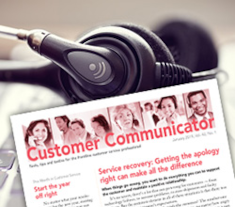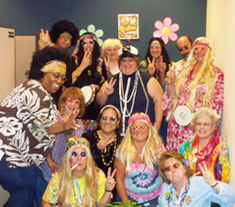How to Deal with Difficult Customers
 It’s happened to every customer service rep. They answer the phone or say "hello," and the customer seems angry or upset right from the start. It’s easy to fall into the trap of taking things personally and becoming defensive or angry. But that never helps. In the training guide, Handling Difficult Customers, the authors take readers…Continue reading
It’s happened to every customer service rep. They answer the phone or say "hello," and the customer seems angry or upset right from the start. It’s easy to fall into the trap of taking things personally and becoming defensive or angry. But that never helps. In the training guide, Handling Difficult Customers, the authors take readers…Continue reading









 Clarifying questions are helpful in demonstrating listening and in confirming important information. In the May issue of Customer Communicator, the training and motivation newsletter for frontline reps, the authors recommend some practical language for clarifying questions. For example: "I understand that 15 widgets were delivered and you ordered 25. Is that correct?" "Let me see if…
Clarifying questions are helpful in demonstrating listening and in confirming important information. In the May issue of Customer Communicator, the training and motivation newsletter for frontline reps, the authors recommend some practical language for clarifying questions. For example: "I understand that 15 widgets were delivered and you ordered 25. Is that correct?" "Let me see if… While reps are often advised to project a high-level of energy when working with customers, there are times when this may not be appropriate. In Customer Communicator, the training and motivation newsletter for frontline reps, author Chris Lynam, stresses the importance of aligning your energy level with your customer’s. He says that you can think about…
While reps are often advised to project a high-level of energy when working with customers, there are times when this may not be appropriate. In Customer Communicator, the training and motivation newsletter for frontline reps, author Chris Lynam, stresses the importance of aligning your energy level with your customer’s. He says that you can think about… Each time a customer service rep speaks to a customer, they take on a unique role. For that brief period of time, they are the company to that customer. In the training guide, Handbook of Essential Phone Skills, the authors provide over a dozen techniques that frontline reps can use to present themselves and their organizations…
Each time a customer service rep speaks to a customer, they take on a unique role. For that brief period of time, they are the company to that customer. In the training guide, Handbook of Essential Phone Skills, the authors provide over a dozen techniques that frontline reps can use to present themselves and their organizations… The April issue of Customer Communicator, the training and motivation newsletter for frontline reps, focuses on creating a positive work environment. To do that, you may need to give up old habits, says author JoAnna Brandi — let go of the urge to dramatize, awfulize, and catastrophize. "A lot of people will say, ’OMG, that is…
The April issue of Customer Communicator, the training and motivation newsletter for frontline reps, focuses on creating a positive work environment. To do that, you may need to give up old habits, says author JoAnna Brandi — let go of the urge to dramatize, awfulize, and catastrophize. "A lot of people will say, ’OMG, that is… Poor listening habits can lead to misunderstandings, errors, missed opportunities, wasted time, and damaged relationships. On the other hand, active listening helps to identify deeper customer needs, it enables a more comfortable relationship with the customer, reduces the likelihood of misunderstandings or tension, and makes problem solving easier. That’s the level of listening that customers…
Poor listening habits can lead to misunderstandings, errors, missed opportunities, wasted time, and damaged relationships. On the other hand, active listening helps to identify deeper customer needs, it enables a more comfortable relationship with the customer, reduces the likelihood of misunderstandings or tension, and makes problem solving easier. That’s the level of listening that customers…